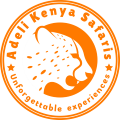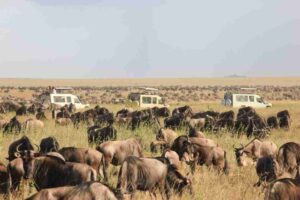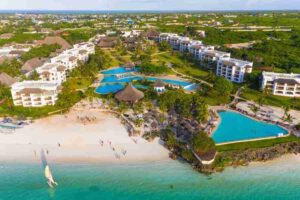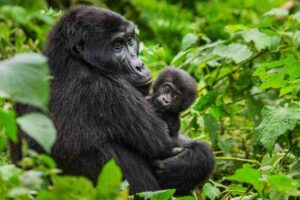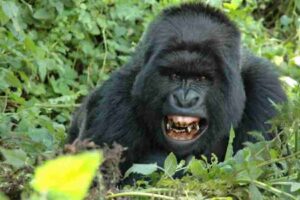| Name of the facility | Severin Safari Camp |
|---|---|
| Certification Achieved | Silver |
| Year opened | 2001 |
| Tourism region | Coast |
| County | Taita–Taveta |
| Address | 82169-80100 Mombasa Map It |
| Telephone/Mobile | +254 41 2111 000, |
| sales@severinsafaricamp.com | |
| Website | severinsafaricamp.com |
| Facility Notes | Severin Safari Camp is a luxurious 27 roomed tented camp with a bed capacity of 54 located in the Tsavo West National Park, on GPS coordinates Latitude -2.998724 Longitude 37.985562. It has a total of 60 employees. Tsavo West National Park is about 7,065 Km2 in size. The park is a popular destination on account of its magnificent scenery, Mzima Springs, rich and varied wildlife, rhino reserve, rock climbing potential and guided walks along the Tsavo River. The savannah ecosystem comprises of open grasslands, scrublands, and Acacia woodlands, belts of riverine vegetation and rocky ridges. Major wildlife attractions include elephant, rhino, Hippos, lions, cheetah, leopards, and Buffalos. It has diverse plant and bird species including the threatened corncrake and near threatened Basra Reed Warbler |
| Energy management | Severin Safari Camp runs on solar and diesel powered generators. There are four (4) generators, two with an output capacity of 40 KvA and two more with 80 KvA. The power is used for lighting, water heating and running refrigerators. Generator power is metered for monitoring purposes. The fuel consumption is also closely monitored for efficiency. Energy consumption is analyzed on guest occupancy. Severin Safari Camp has invested in solar water heaters which are connected to a heat exchanger system fixed on the generator exhaust. The heat exchanger uses hot fumes produced by the generator and electrical motors for water heating. The entire system has a capacity of 4000 litres. It is well insulated to enhance efficiency and the hot water is metered for monitoring purposes. Guests are briefed on energy conservation on arrival and through information folders in the guest tents while staff is sensitized through staff meetings and departmental briefings. In addition, main switches are fixed in the guest tents for easier clients’ accessibility to switch off unnecessary lights. Energy saving bulbs and light emitting diodes are installed throughout the facility for power conservation. Security flash lights and torches are solar rechargeable |
| Environmental management | Severin Safari Camp is guided by its environmental policy showing commitment to environmental conservation; environmental management; compliance with relevant environmental and government legislations; pollution prevention; human rights and promoting social responsibility. The facility has an environmental management system (EMS) to spearhead its operations. The EMS includes panning for impact reduction, implementation and operation, monitoring (checking) and management review. The camp has undertaken its annual Environmental Audit (EA) as required by EMCA 1999 (Environmental Management and Co-ordination Act.) |
| Chemical use | Gas is bought in 50Kg cylinders for staff and guests cooking respectively. The storage section is caged and signage installed for safety purposes. The fuel (diesel) is stored in a 16,000 litres underground tank. The camp uses biodegradable bathroom amenities such as bathing soaps and shampoos in the guest tents supplied by Clique Limited. Diversey and Starlite Chemicals are used for laundry and cleaning purposes. Material Safety Data Sheet (MSDS) for the chemicals are available |
| Conservation Criteria | |
| Community Criteria | |
| Solid waste management | Waste separation (paper, plastics, metals, glass and organic) is conducted at source. Organic waste is composted. The rest is put at a waste collection centre for further segregation before disposal via Severin headquarters to recycling companies in Mombasa. The camp monitors its waste generation through an inventory (quantity and type) for legal compliance and to create efforts towards waste reduction at source. Waste production is also analysed based on guest occupancy. |
| Water management | The camp obtains its water from a spring located within the National Park. The water is pumped and stored in reservoir tanks with a capacity of 100,000 litres. The water is treated, through chlorination and filtration system before supply to the entire premises. A water meter has been installed at source and main outlet to monitor the water usage. The obtained water records are used to analyze water consumption based on guest occupancy for monitoring purposes. Guests are sensitized about water conservation on arrival. In addition, guests are encouraged to re-use their towels through “towel-talks” as a means to conserve water. Staff is sensitized during regular briefings. The guest tents are fitted with high pressure shower filter heads (fixed with faucets –tap flow reducers) for water use efficiency. |
| Visitor communication & education | Booklets and room information folders are available at the restaurant section and guest tents respectively. Publications such as Africa Geographic magazines, Books on Kenya, Tsavo National Park and its ecosystem, Birds of Kenya, mammals and bird list are availed at the section for sensitization / communication purposes. Visitors are briefed upon arrival on the camp’s operations, and environmental values. In addition, the guest tents are equipped with room information folders to brief the visitors on environmental conservation activities and initiatives |
| Pollution | Used oil is stored in 20 litre jerry cans in a bunded section to prevent accidental spillage to the environment. |
| Environmental conservation | The natural vegetation within the facility is relatively undisturbed. The pathways are demarcated using locally available lava gravel. Severin Safari Camp support to conservation is through payment of the park fee to Kenya Wildlife Service. Approximately Kshs. 500, 000 is paid on monthly basis |
| Waste water management | Effluent from the staff and guest kitchen is managed through a grease trap to filter fats and oils before draining into a waste water treatment system. Black and grey water for the facility is managed through a treatment plant and used for watering the lawns within the premises. The facility has two main treatment plants. • The 1st treatment plant has four (4) chambers fixed with a filtration system; bio enzymes are added to digest the sludge. The treatment caters for staff quarters and laundry waste water. • A 2nd treatment plant is installed at the staff quarters area. The Bio-lava treatment plant uses bio-filtration system and manages effluent from the guest kitchen and guest tents. Water effluent tests have been conducted in compliance with Environmental Management Co-ordination (Water Quality) regulations of 2006. Subsequently, an Effluent Discharge License has been applied for the facility. Swimming pool water is cleaned via sieving, vacuum cleaning and backwash system. PH levels (i.e. acidity and alkalinity levels) are checked on daily basis. An automated chemical dispensing system has been installed for pool chlorination purposes. |
| Purchasing and supplies | The facility purchases its products in bulk to reduce on packaging; fruits and vegetables are packed in re-usable crates whereas meat is packaged in freezers. |
| Employment and remuneration/staff welfare | The facility has a staff committee and Union committee which represents staff issues to the management. Staff benefits include food, uniform, entertainment centre, transport and accommodation. |
| Staff education, communication and awareness training | The environmental policy is clearly communicated to the staff through, strategically fixed signage, daily briefing from the management and in house sensitization. The camp has an in-house staff training program where employees are sensitized on the facility standard operating procedures, languages, and computer packages. |
| Cultural preservation and promotion/protection of local sites | The camp facilitates guests Maasai village visits at a fee remitted to the locals. Visitors get to experience local culture, purchase local curios, cultural talks and entertainment dances. |
| Benefits to local community/community empowerment | Severin Safari Camp purchases from the locals where possible, vegetables and curios are bought locally form Mtito Andei and Voi. Meat for staff meals is also bought locally. On ad hoc basis and on demand, the facility arranges village visits to Eltelal village. Guests pay $10 per guest, payable to the community. Severin Safari camp ensures payment of requisite fees (financial obligations) as follows; • Land Lease: Pays land fee to Kenya Wildlife Service. At least Kshs.500, 000 is paid on monthly basis. • Park fee: Clients pay 75 USD per night |
| Cultural Criteria | |
| Health and safety | Precautionary and safety signage such as ‘Hatari’ ‘highly flammable’ are strategically fixed at relevant places such as the fuel and gas storage areas. Proper Housekeeping (well arranged, clean, and properly ventilated) was seen at the food and dry goods storage area and in the repairs and maintenance section. The camp has undergone Health Inspection and issued with a Health Inspection Certificate. There is an adequate team of staff (the camp manager, guides and heads of departments) trained on first aid. Well-equipped first aid kits are available at the main office, kitchen and game drive vehicles. Adequate fire-fighting equipment including, fire extinguishers, fire blanket in the kitchen, are serviced and strategically placed throughout the facility. There is an emergency procedure/fire evacuation procedure in place. This is availed in the public areas and within the guest tents. A fire assembly point is properly marked and displayed within the facility. A fire alarm is also available. Safety signage is fixed in all key areas such as the swimming pool, fuel storage and gas storage areas respectively. The facility has conducted a comprehensive health and safety audit in compliance with Occupational Safety and Health Act 2007. The camp provides PPE (Personal Protective Equipment) such as overall, gloves and boots to the repairs and maintenance staff. |
| Child labor, abuse and human rights | The camp has a policy in place addressing their stand on Child labor, abuse and human rights. The policy is well displayed in the public notice board alongside other policies. |
| Business Practises Criteria | |
| Entry Date | 12th March 2018 |
Severin Safari Camp
Safe, Sustainable, Affordable & Unforgettable Africa safari experiences that Educate, Connect, Transform and Inspire.
Your dream safari in Kenya & East Africa is just a call or email away. Contact Adeli Kenya Safaris today. Tel: +254720564538 | WhatsApp: +254720564538 | Email: info@adelikenyasafaris.com
Share this:
Why Go with Adeli Kenya Safaris
- Born, raised & based in Africa. Let u show you the Africa we know well and cherish so much
- Africa sustainable travel is our passion
- Great Value for Money. Best price guaranteed
- Experienced team of travel experts
- Knowledgeable & multi-lingual safari guides
- Safety conscious
- Fleet of well maintained vehicles
Your dream safari / holiday is just a call or email away. Contact Adeli Kenya Safaris today. Tel: +254720564538 | WhatsApp: +254720564538 | Email: info@adelikenyasafaris.com
EXPLORE OUR FEATURED EAST AFRICA SAFARI HOLIDAY DESTINATIONS
FEATURED TOURS & HOLIDAY PACKAGES BY COUNTRY
Go Wander the wonderful world with Adeli Kenya Safaris

Africa Safari Tour Packages
Africa is more than just a destination—it is a feeling, an awakening, and a journey that touches the soul in ways words can hardly capture. Africa is a continent that stirs the soul, awakens curiosity, and leaves every traveler forever changed.
Europe Holiday Packages
SouthEast Asia Holiday Packages
Middle East Holiday Packages
Indian Subcontinent Holiday Packages
Central Asia Holiday Packages
Far East Holiday Packages
Australasia Holiday Packages
North America Holiday Packages
Central America Holiday Packages
South America Holiday Packages
Cruise Holiday Packages
Adeli Kenya Safaris, Kenya safari, African safari Kenya, Wildlife safari Kenya, Kenya wildlife tours, Kenya game drives, Safari holidays Kenya, Kenya safari tours 2025, Best Kenya safaris, Luxury Kenya safaris, Affordable Kenya safaris, Masai Mara safari, Amboseli safari, Tsavo National Park safari, Lake Nakuru safari, Walking safari Kenya, Hot air balloon safari Masai Mara, Birdwatching safari Kenya, Family safari Kenya, Photography safari Kenya, Cultural safari Kenya, Beach and safari Kenya, Private safari Kenya, Fly-in safari Kenya, Camping safari Kenya, Luxury tented camps Kenya, Best time to see the Great Migration in Masai Mara, Affordable family safari packages in Kenya, Luxury safari lodges in Kenya with private game drives, Walking safaris in Laikipia conservancy, Hot air balloon safari over Masai Mara at sunrise, Best birdwatching spots in Kenya during November, Family-friendly safari resorts near Nairobi, Photography tours in Amboseli with Kilimanjaro views, Cultural experiences with the Maasai tribe in Kenya, All-inclusive beach and safari packages in Kenya coast, Private guided safaris in the Chyulu Hills, Fly-in safari to remote areas of northern Kenya, Budget camping safaris in Tsavo East National Park, Luxury tented camps in the Mara Triangle for honeymooners, Best wildlife viewing in Kenya during the dry season (July-October), Ethical wildlife safaris in Kenya supporting conservation, Small group safari tours in Kenya for solo travelers, Wheelchair accessible safari options in Kenya, Kenya safari itineraries for first-time visitors, Best Kenya safari for seeing rhinos, Tanzania safari, African safari Tanzania, Wildlife safari Tanzania, Tanzania wildlife tours, Tanzania game drives, Safari holidays Tanzania, Tanzania safari tours 2025, Best Tanzania safaris, Luxury Tanzania safaris, Affordable Tanzania safaris, Serengeti safari, Ngorongoro Crater safari, Zanzibar safari, Tarangire safari, Lake Manyara safari, Ruaha National Park safari, Nyerere National Park (Selous) safari, Kilimanjaro safari (often combined with wildlife), Mahale Mountains chimpanzee trekking, Gombe Stream chimpanzee trekking, Best time to see the Great Migration in Serengeti, Luxury lodges in Ngorongoro Crater with wildlife viewing, Family safari packages in Tanzania with beach extension, Walking safaris in northern Tanzania, Hot air balloon rides over the Serengeti plains, Birdwatching tours in Lake Manyara National Park, Cultural tours in Tanzania combined with safari, Affordable camping safaris in Tanzania’s southern circuit, Photography workshops on Tanzania safaris, Honeymoon safari packages in Serengeti and Zanzibar, Wildlife safaris near Arusha for short trips, Chimpanzee trekking tours in western Tanzania, Best Tanzania safari for seeing the Big Five, Small group safari tours in Tanzania for solo travelers, Tanzania safari itineraries including Kilimanjaro trek, Ethical and sustainable safari options in Tanzania, Fly-in safaris to remote parks in Tanzania, Best time for wildlife photography in Tanzania, Tanzania safari deals and discounts, Serengeti Great Migration river crossing tours, best tour company in Kenya, best safari company in Kenya, best tour operator in Kenya, best travel company in kenya, best travel agency in kenya, best kenya safari company, nairobi safaris, nairobi kenya safaris, kenya safaris, safari in kenya, kenya wildlife safaris, kenya safari tour, kenya tours, Best responsible tours and travel agency in kenya, Best responsible tours and travel company in Tanzania, Best responsible tours and travel company in Zanzibar, Best responsible tours and travel company in Uganda, Best responsible tours and travel company in Rwanda, Best responsible tours and travel company in Botswana, Best responsible tours and travel company in Namibia, Best responsible tours and travel company in South Africa, Best responsible tours and travel company in Mauritius, Best responsible tours and travel company in Seychelles, Best responsible tours and travel company in Madagascar, Best responsible tours and travel company in Mozambique, Best responsible tours and travel company in Egypt, Best responsible tours and travel company in Israel, Best responsible tours and travel company in Thailand, Best responsible tours and travel company in East Africa, Best responsible tours and travel company in Eastern Africa, Best responsible tours and travel company in Africa, Best responsible tours and travel company in the world, Best responsible tours and travel company in Thailand, Best responsible tours and travel company in Malaysia, Best responsible tours and travel company in Croatia, Best responsible tours and travel company in Vietnam, Best responsible tours and travel company in Dubai, Best responsible tours and travel company in Singapore, Best responsible tours and travel company in Brazil, Best responsible tours and travel company in America, Best responsible tours and travel company in Canada, Best responsible tours and travel company in Europe, Best responsible tours and travel company in Greece, Best responsible tours and travel company in Turkey, Best responsible tours and travel company in Faroe Islands, Best responsible tours and travel company in Morocco, What is ecotourism, responsible travel, best green tourism company in kenya, best sustainale travel company in kenya, best ecotourism ompany in kenya, best sustainable travel practices, best things to to do in kenya, best things to to do in Nairobi, best things to to do in kenya, best things to to do in Mombasa, best things to to do in kenya, best things to to do in kenya, best things to to do in Nakuru, best things to to do in kenya, best things to to do in Naivasha, best things to to do in kenya, best things to to do in Maasai Mara, best things to to do in kenya, best things to to do in Kisumu, best things to to do in kenya, best things to to do in Amboseli, best things to to do in kenya, best things to to do in Tsavo West, best things to to do in kenya, best things to to do in Tsavo West, best things to to do in kenya, best things to to do in Samburu, best things to to do in kenya, best things to to do in Tanzania, best things to to do in kenya, best things to to do in Zanzibar, best things to to do in kenya, best things to to do in Uganda, best things to to do in kenya, best things to to do in Uganda, best things to to do in kenya, best things to to do in Rwanda, best things to to do in kenya, best things to to do in Mauritius, best things to to do in kenya, best things to to do in Seychelles, best things to to do in kenya, best things to to do in South Africa, best things to to do in kenya, best things to to do in Mozambique, best things to to do in kenya, best things to to do in Madagascar, best things to to do in kenya, best things to to do in Zambia, best things to to do in kenya, best things to to do in Israel, best things to to do in kenya, best things to to do in Dubai, best things to to do in kenya, best things to to do in Thailand, best things to to do in kenya, best things to to do in Greece, best things to to do in kenya, best things to to do in Santorini, best Tour Operator in Kenya, bestTour Operators in Nairobi, Tours in Kenya, Travel Agency in Nairobi, safari, kenya safari, kenya tours, tours and travel kenya, eco safaris, ecotourism, eco tourism, responsible travel, green tourism, agro tourism, east african safari air, kenya tanzania tours, africa tours, masaimara safari, tanzania safari, kenya travel, africa safari, nairobi safari, kenya safari tours, african safari, kenya safaris from nairobi, kenya wildlife safari, serengeti safari tour, safar tours & travels, best tour operators, luxury african safari tours, best african safari for seniors, african safari and beach package holidays, africa safari camp, kenya safari packages, kenya safari holidays, uganda safari packages, best places to go on safari in africa, best african safari itinerary, kenya wildlife safari packages, deal africa, travel operators, tour africa safaris kenya, luxury safari company, east african safari packages, safari travel companies, top safari tour operators, african safari travel agent, africa travel deals, trip safari, best safari experience, african safari photography, kenya holidays 2018, kenya safaris from nairobi, kenya safari, kenya holiday packages, kenya holidays, weekend getaways in nairobi, holiday destinations in kenya, weekend getaways in kenya, kenya safari holidays, tours and travel kenya, domestic holiday packages in kenya, kenya safari packages, tour operators in kenya, kenya destinations, kenya holidays 2017, kenya travel, kenya tours, tours and travel companies in kenya, kenya safari tours, safari kenya, kenya holidays 2018, kenya safari prices, holidays in kenya, travel agencies in kenya, dubai holiday packages from kenya, cheap holiday packages in kenya, cheap holiday destinations in kenya, getaways in kenya, kenya safari all inclusive packages, kenya all inclusive resorts, cheap january holiday deals, dubai holiday packages from dubai, vacation places in kenya, affordable holiday destinations in kenya, holiday getaways in kenya, trip kenya, kenya safari beach holidays, kenya safari vacation packages, travel package holidays, best travel package deals, trip to kenya safari, kenya’s best DMC, Kenya’s best tour operator ‘ Kenya’s best travel agency , Africa’s best DMC , Africa’ best tour operator , best kenya tour companies, luxury tour companies in kenya , why I love kenya , #whyilovekenya , join up safaris kenya , budget safaris in kenya , flying packages kenya , beach safaris in kenya , top rated tour companies in kenya , rooftent camping in kenya, safaribookings , tripadvisor, photography safaris in kenya , , best Tanzania safaris , kenya and Tanzania safaris , Tanzania road safaris , Tanzania flying packages, dubai packages , south Africa holiday packages, Seychelles holiday packages , Mauritius holiday packages , easter holiday packages , Christmas holiday packages , Wildebeest migration, kenya wildebeest migration, wildebeest migration kenya, wildebeest migration in Kenya, masaimara national reserve, travel kenya, traveling to kenya, travelling to kenya, kenya travel advisory, kenya travel advice, travel in kenya, travel agents in kenya, travelling in kenya, traveling in kenya, kenya travel agents, travel to kenya advice, travel advice to kenya, travel agents kenya, travel advisory to kenya, travel agency kenya, travel advisor kenya, travel alerts kenya, travel agencies kenya, kenya travel agencies, travel deals kenya, travel diaries kenya, kenya travel tips, tour operators in kenya, kenya tours and safaris, tours in kenya, tours and travel kenya, tours kenya, tours of kenya, kenya tour companies, tours and travel in kenya, tour to kenya, kenya tours and travel companies, kenya wildlife tours, tours and travels in kenya, trip to kenya, trips to kenya, kenya trip, kenya trips, trip to kenya Africa, trip advisor kenya, kenya trip advisor, visit kenya, visiting kenya, kenya visit, where to visit in kenya, why do people visit kenya, kenya tourism, tourism in kenya, tourism kenya, tourism of kenya, kenya and tourism, kenya safaris, safaris in kenya, safaris kenya, kenya lodge safaris, african safaris kenya lodge safaris kenya, safaris to kenya, kenya camping safaris, kenya african safaris, camping safaris kenya, kenya tourist attraction, tourists in kenya, tourist attraction in kenya tourist spots in kenya, kenya tourists, kenya tourist spots, why do tourists visit kenya, kenya holiday, holidays in kenya, holidays to kenya, kenya holidays, holiday in kenya, holidays kenya, holiday to kenya, holiday kenya, kenya travel guide, travel guide kenya, kenya guide, travel guide to kenya, kenya information guide, kenya tour packages, kenya holiday packages, kenya vacation packages, kenya packages, holiday packages in kenya, kenya travel packages, holiday packages kenya, kenya package, kenya holiday package, kenya tour package, kenya package holidays, travel packages kenya, kenya safaris packages, places to visit in kenya, kenya places to visit, best places to visit in kenya, tourist places in kenya, places to see in kenya, kenya tourist places, places in kenya to visit, places to visit kenya, go kenya tours, go kenya, places to go in kenya, go to kenya, where to go in kenya, going to kenya, why do people go to kenya, why go to kenya, information on kenya, kenya information, kenya travel information, information kenya, information of kenya, holiday destinations in kenya, kenya destinations, tourist destinations in kenya, kenya holiday destinations, kenya tourist destinations, best holiday destinations in kenya, kenya as a tourist destination, holiday destinations kenya, blogs in kenya, travel blog kenya, kenya blogs, blogs travel to kenya, safaris in kenya, kenya safaris, safaris kenya, safaris to kenya, car hire Nairobi, car hire in Nairobi, nairobi car hire, car hire services in Nairobi, car hire kenya Nairobi, car hire companies in Nairobi, car hire nairobi kenya, cars for hire in Nairobi, car hire in kenya Nairobi, car hire services Nairobi, cheap car hire Nairobi, nairobi car hire services, car hire in nairobi kenya, car hire companies in nairobi kenya, car for hire in Nairobi, car hire companies Nairobi, 4wd car hire Nairobi, cheap car hire in Nairobi, car hires in Nairobi, nairobi airport car hire, 4×4 car hire Nairobi, car hire market, cars for hire nairobi , car hire Mombasa, car for hire Nairobi, car hire uganda , 4×4 hire Nairobi, car hire Tanzania, 4×4 car hire dar es salaam, 4×4 car hire Tanzania, car hire kenya, 4×4 car hire kenya, car hire in kenya , kenya car hire, 4×4 car hire Uganda, 4×4 car hire Arusha, kenya tours and safaris, tours in kenya, tours and travels in kenya, tours kenya, tours of kenya, tours to kenya, go kenya tours, tour to kenya , car hire companies in kenya , 4wd car hire kenya, go kenya tours and safaris, kenya wildlife tours, car hire services in kenya, terminal tours kenya, kenya tanzania tours, tours and travel in kenya , kenya budget tours , tours and travel jobs in kenya, tours and safaris in kenya , kenya adventure tours, tours kenya Tanzania, tour operators, tanzania tour operators, tours and travel kenya, tour operators in Tanzania, top tour operators, african tour operators, tour firms in kenya , car hire kenya rates , car hire in kenya prices, kenya car hire services, mombasa tour operators, cars for hire in kenya, car hire kenya prices, kenya safaris, car hire business in kenya, tour kenya, kenya wildlife safaris, safaris to kenya, kenya camping safaris, wildlife safaris kenya, african safaris kenya, kenya budget safaris, safaris kenya, kenya tanzania safaris, kenya african safaris, tour companies in kenya, kenya car hire companies, car hire services kenya, cheap car hire in kenya, tours and travel companies in kenya, tour and travel companies in kenya, kenya tour companies, executive car hire kenya, tour companies kenya, wildlife kenya safaris, safaris in kenya, travel companies in kenya , tourism companies in kenya, kenya tours and travel companies, tours and safaris companies in kenya, companies in kenya, list of companies dealing with travel tours in kenya, kenya tour, tours companies in kenya, list of tour companies in kenya, best companies in kenya, kenya companies, 4×4 camping, 4×4 holidays, camping 4×4, 4×4 excursion, kenya tours,kenya best hotels,best hotels in kenya,kenyahotels,honeymoon destinations in kenya, 4×4 kenya, Rooftemt camping in kenya, rooftent hire in kenya, Nairobi safari tours, mombasa safari tours, amboseli safari tours, nakuru safari tours, naivasha safari tours, lake bogoria safari tours, lake baringo safari tours, maasai mara safari tours, tsavo east safari tours, tsavo west safari tours, samburu safari tours, ol pejeta conservancy safari tours, aberdare national park safari tours.
